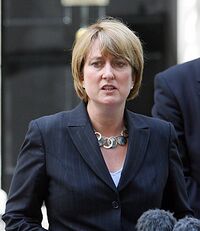Niamh Nic Uilliam
Niamh Nic Uilliam | |
|---|---|
 Nic Uilliam in 2001 | |
| Taoiseach of Caldia | |
| In office 15 June 1992 – 17 March 2002 | |
| Monarch | Ellen II Elton II |
| Deputy | Conán Mac Donnchadh Séamus Ó Faoláin |
| Preceded by | Patricia Flowers |
| Succeeded by | Séamus Ó Faoláin |
| Leader of Her Majesty's Most Loyal Opposition | |
| In office 21 June 1987 – 15 June 1992 | |
| Monarch | Ellen II |
| In office 14 April 1985 – 21 June 1987 | |
| Leader of the Social Democrats | |
| In office 21 June 1987 – 4 August 2001 | |
| Member of the Euclean Parliament | |
| In office 3 September 2004 – 15 July 2009 | |
| Teachta Comhthionól for Tóinderry-Adhmaburgh | |
| In office 12 June 1982 – 1 January 2004 | |
| Personal details | |
| Born | Niamh Nic Uilliam 27 February 1949 Adhmaburgh, County Tóinderry, Caldia |
| Political party | Social Democrats |
| Spouse | Eilís Nic Cheallach |
| Children | 3 children |
Niamh Nic Uilliam (born 27 February 1949) is a retired Caldish politician and served as the Taoiseach of Caldia from 1992 to 2002. She was the leader of the Caldish Social Democratic Party from 1987 until 2001. From 2004 until 2009 she was a member of the Euclean Parliament.
Nic Uilliam is remembered for reforms made to education, welfare, and the environment in addition to the 2001-2002 Caldish government crisis. She was the first taoiseach to be removed from the office by the Caldish monarch in the nation's history.
Early life
Nic Uilliam was born to a middle class family in Adhmaburgh, County Tóinderry. Her parents were Muirís Mac Uilliam, a secondary school teacher, and Deirbhile Nic Beathag, a university professor. She spent her childhood in her native Adhmaburgh where she attended school. Nic Uilliam studied at St Adomnán's University and received a degree in education. She then studied early childhood education at the University of Verlois and obtained a masters degree. While at university, she was involved in the Social Democratic Party's student union.
After university, she worked as a primary school teacher in County Tóinderry and became active within the Caldish Teachers' Union (AMG).
Political career
Member of the Comhthionól
She was first elected as a member of the Comhthionól Náisiúnta in 1982 for the Tóinderry-Adhmaburgh constituency. Her election was supported by the teachers' union and she worked closely with the AMG while in the Comhthionól.
Nic Uilliam supported education reform efforts that failed to materialize. She was a frequent critic of Patricia Flowers but also dissented from the PSD's leadership. This resulted in her reassignment from more influential committees to less important ones in 1983. However, she later became the party's spokesperson for education.
In 1985, Nic Uilliam became deputy leader of the Social Democrats with Fíona Nic Chonsaidín. After the PSD's defeat in the 1987 election, she was elected leader of the party. As party leader, she criticized the Flowers government for being too extreme in its support of economic liberalism and called for a more moderate approach. Her positions differed with the PSD's traditional support for socialism, which lost electoral support after the 1970s recession. She adopted moderate economic positions and supported what she described as "sensible socialism".
In the 1992 election, the Social Democrats' had their best electoral performance since 1935. The party won a 221 seats in the Comhthionól, a majority.
Taoiseach
Nic Uilliam was installed as taoiseach by a vote of the Comhthionól on 15 June 1992 and became the youngest person to hold the office at that time. She formed the first PSD majority government since 1967. Early hopes that her government would reverse much of the previous government's economic policy faded as Nic Uilliam's cabinet came from the PSD's right faction.
After coming to power, Nic Uilliam sought to reform the education system and continue to expand the economy. She favored free trade and opposed protectionism and supported targeted economic intervention. Her government also expanded public assistance programs, reversing cuts made by her predecessor. Nic Uilliam declined to raise the corporate tax rate or personal income tax rates. The shift in Caldia's economic development away from agriculture and industry was reflected in Nic Uilliam's education policy. The government worked to meet the demand for a highly-educated workforce resulting from Caldia's emerging knowledge-based economy.
Nic Uilliam supported the creation of the State Pension Fund in 1993 and later sponsored the creation of the State Investment Fund in 1995. During her second term, she worked to create the third state sovereign wealth fund: the State Expenditure Fund.

Throughout her tenure she supported deeper integration of the Euclean Community and her government implemented policies that kept Caldia on track for membership in the euclozone. Nic Uilliam also supported the establishment of free trade agreements between the EC and aligned economies.
Her support for economic liberalism resulted in party infighting within the PSD. In the run up to the 1997 election, a splinter group formed the Industrial Labour Party.
She led the Social Democrats into the 1997 election and was re-elected. Her party lost its majority and initially Nic Uilliam struggled to secure majority support for her government. In July 1997, a coalition agreement was reached with the Green Party. The Centre Party agreed to support the government's installment and budget proposals, allowing Nic Uilliam to form a second government. Her second term failed to materialize in significant legislation. Environmental protection laws were strengthened in 1998 and expanded again 2001. However, Nic Uilliam failed to pass much of her desired agenda. Her popularity began to wane and the PSD lost support in opinion polls and local elections.
In August 2001, she was replaced as party leader by Séamus Ó Faoláin, her deputy. However, Nic Uilliam refused to step down as taoiseach. This triggered a political crisis that would last until she was eventually removed by the office. Both Nic Uillian and Ó Faoláin sought the mediation of Caldia's long-serving monarch, Ellen II. Her abdication in February 2002 further complicated the unresolved government crisis. Her successor, Elton II, had little political experience. Ó Faoláin and the PSD's senior leadership lobbied the monarch to dismiss Ni Uilliam as Taoiseach and appoint Ó Faoláin. Nic Uillian was removed from her office by the monarch on 17 March 2002. This resulted in significant controversy. It quickly became an issue for the 2002 general election, which the PSD later went on to lose.
Nic Uilliam continued to server in the Comhthionól until she resigned in January 2004.
Euclean Parliament
Nic Uilliam was elected to the Euclean Parliament in 2004. She was re-elected in 2009 and retired at the 2014 election. She sat on both the Culture and Education Committee and the Foreign Affairs Committee. She was assigned to the Subcommittee on Human Rights, which she chaired from 2009 to 2014.
She mostly focused on expanding the Euclean Community's support for education and research. Nic Uilliam also spoke out against human rights abuses. At times, she was critical of the Euclean Commission for its response to human rights violations.
After politics
Nic Uilliam left politics in 2014 and has since worked with international non-profits. Her non-profit work has mostly centered on women's issues, including expanding girls' access to education globally. She has partnered with the Community of Nations on this issues in addition to philanthropic organizations. In 2019 Nic Uilliam was appointed to lead the Vamvakas Foundation, a philanthropic organization established by Caldo-Piraean billionaire Evangelos Vamvakas.
In 2017, she became a consultant for the Sotherby Group, an Estmere-based financial services company for which she is reported to be paid €150,000 annually.
Personal life
Nic Uilliam is married to Eilís Nic Cheallach, a lawyer. The two have been married since 1973. Together, they have three children and have maintained residences in both Adhmaburgh and Spálgleann. Her youngest daughter, Saoirse, was killed in an automobile accident in 2018. She has two grandchildren. Nic Uilliam was the world's first head of government to openly identify as a lesbian.
She is a member of the Church of Caldia and considers herself to be a practicing Sotirian.
Legacy
Nic Uilliam remains a controversial figure among the Caldish left. While she is regarded by political commentators for bringing the Social Democrats back into the mainstream, she divided her party. Initially, her portrayal as a moderate and pragmatic alternative to the more right-wing Patricia Flowers proved popular. Her carefully crafted public image contributed to her early popularity. However, her commitment to economic liberalism lost her support from among the PSD's traditional working class base. Nic Uilliam brought new, moderate middle class voters to the party at the expense of the working class vote. She was accused of abandoning socialism and the working class, earning criticism from members of her own party and affiliated trade unions.
The party infighting that plagued the later years of her leadership also had a long-lasting effect on the party. The PSD lost the 2002, 2007, 2012, and 2017 elections, a historic first. The party only returned to governance after the 2019 snap election.
She is best remembered for her comprehensive reforms to the Caldish education system. Nic Uilliam is often credited as being responsible for Caldia's status as a model for education. Her government was also the first to expand environmental protection laws in Caldia. The establishment of the State Pension Fun and the Caldish government's additional soverign wealth funds are also among her achievements.